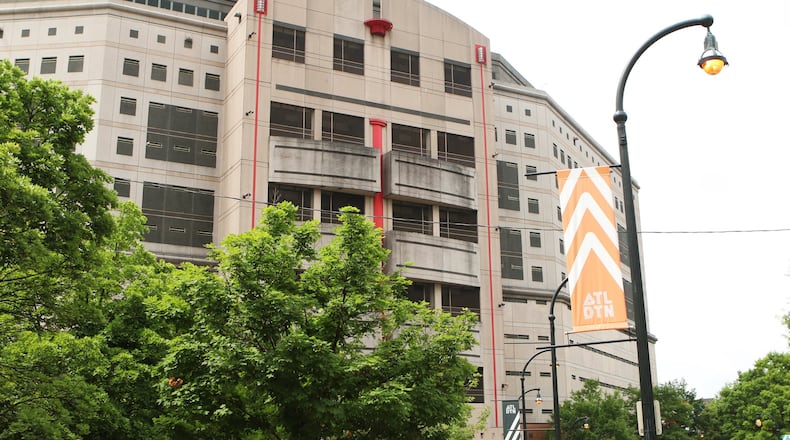After years of discussion, Mayor Keisha Lance Bottoms’ top deputies on Thursday provided the most detailed description yet of how the administration plans to close the city’s detention center.
It was immediately met with questions, hesitation and pushback from members of the City Council.
The proposal was discussed during a virtual afternoon work session, and explained how the city would eliminate a number of jail employees and spend that money on programs to reduce bookings with pre-arrest diversion programs. The proposal also encourages ticketing instead of arresting for some low-level, non-violent charges. Closing the jail would also mean moving booking and processing to the city courthouse.
Bottoms’ administration is also seeking to update the city code to remove jail time as penalties for some minor offenses.
Atlanta Chief Operating Officer Jon Keen said the plan could cost $5 to $10 million.
Atlanta currently uses about 4% of the 471,000-square-foot Atlanta City Detention Center on Peachtree Street, Keen said. The 1,300-bed jail has a daily average intake of 25 to 30 low-level inmates.
The small number of inmates could be housed at a new public safety training facility, which hasn’t yet been approved and is the subject of an advisory council.
The sharp reduction in jail population is a result of several of Bottoms’ criminal justice reforms over the last few years. That includes the elimination of cash bond and the termination of a contract to hold U.S. Immigration and Customs Enforcement detainees.
Once closed, the city may raze the jail and build a “Center for Equity” on the property, which was the main recommendation of a 26-page report from a 52-member task force created in 2019 by Bottoms to “reimagine” the jail.
Keen said he hoped to have the closure plan approved by the council March 15. The presentation focused on the administration’s plans to close the jail, rather than what might replace it.
But no City Council members spoke in favor of the plan as presented Thursday. The officials pushed back, saying the plan felt rushed and didn’t make moral or financial sense — though several council members acknowledged that closing the jail is a central goal of Bottoms, who is up for re-election this year.
Joyce Sheperd, the chair of the council’s public safety committee, said she wanted to hold more meetings with Fulton County and Atlanta Municipal Court officials before signing on to a plan. She proposed holding two or three more work sessions on the issue.
“We need to get this right. I know the mayor made a promise ... (but) we need more time to do an assessment of this,” Sheperd said.
“Our community needs a comprehensive solution, not symbolism,” said Councilman J.P. Matzigkeit, who represents a district in Buckhead, where residents have loudly voiced concern over the rise in violent crime.
Some council members mentioned newly elected Fulton County Sheriff Patrick Labat’s request to buy the detention center, which was not mentioned in the presentation. Labat said he needs the jail in its current form to successfully protect the county, which has a 2,500-bed jail on Rice Street that has struggled with overcrowding for years.
Credit: Elijah Nouvelage
Credit: Elijah Nouvelage
Some of the council members tied their hesitation to the recent rise in homicides and other violent crimes. But that argument doesn’t hold up since the Atlanta detention center does not handle felony cases, said Hannah Riley, the communications director at the Southern Center for Human Rights.
“Closing ACDC will not adversely impact violence or crime. ... It has absolutely no impact on violent crime,” Riley said after the meeting. She supports Bottoms’ goal to close the jail, but said she would have liked to hear more specifics from her office about when that might happen.
“This has already been a fairly drawn-out process, and it just feels like it’s going to be even longer at this point,” Riley said.
The council’s discussion was followed by four hours of public comments sent in from residents on both sides of the issue.
Many callers said they were Buckhead residents wanting to keep the jail open or sold to Fulton County, citing fears about crime. One woman said that the city will lose “valuable” people who would move away if the jail closes.
Task force member Devin Barrington-Ward spoke in support of closing the jail during public comment.
“There are forces in this city that are trying to take us back, take us back to a time where we used cages to cure the problems that plagued our community, problems that stem from systemic racism,” he said.
Barrington-Ward, a Bankhead resident and activist, added: “Buckhead does not run this city.”
But the uncertainty isn’t just coming from Buckhead.
“We are still hammering it out and I still have lots of questions and unreadiness about ‘all or nothing,’” said Councilwoman Marci Collier Overstreet, a Bottoms’ ally whose district includes much of southwest Atlanta.
Keep Reading
The Latest
Featured






